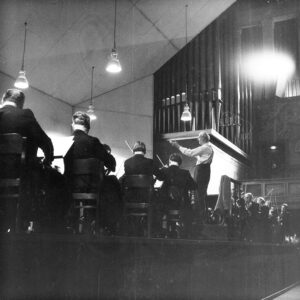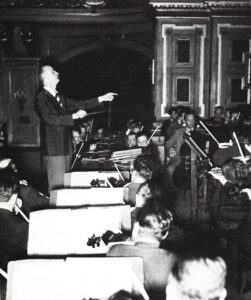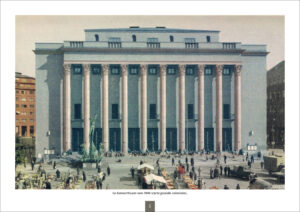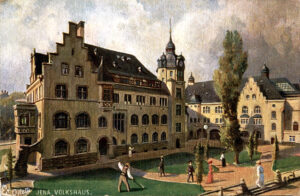Month: September 2023
News
The SWF regularly acquires programmes of concerts conducted by Furtwängler. But you may also contribute: if you come across one of these precious documents, please think of us all.
This is what one of our members did — many thanks to him — by providing us with the programme of the concerts performed by the Berliner from 13 to 16 November 1943. Here it is.
Its distinctive characteristics include the presence of a French soloist, the great Pierre Fournier for Schumann’s Concerto, and one of the rare performances of Bruckner’s 6th Symphony.
For various reasons, it will not be possible for us to dispatch ‘physical’ discs (CDs) between 1 October and 10 November.
Please place your orders in the shop now or wait until 10 November.
Thank you for your understanding.
Nils-Göran Olve, one of our Swedish correspondents, is the son of a violinist who played for a long time in the Stockholm Philharmonic Orchestra, hence under Furtwängler’s baton.
He participated in our recently released album SWF D12, writing the booklet with Göran Soderval. He did so while he did not yet have the restoration done by the SWF, knowing only previous editions. After downloading and listening to the album, he sent us the following comment.
“I’ve now listened carefully to your new issue, and my admiration for the performances and the sound restoration only grows! Compared with the previous releases that I know there is more transparency and less disturbing reminders that these were acetates or lacquers which were stored for a quarter-century before being rescued in the 1960s. I was also afraid that the tapes had deteriorated from the half-century which elapsed before SWF bought the new digital transfer. Yes, the sound of the full orchestra is not always quite undistorted, and there is background noise. But I felt I had not given proper attention to the music-making. Don Juan is interesting throughout. The Tristan Prelude is at an ideal pace, and in the Liebestod I don’t miss the soprano part — in fact, Furtwängler makes a case for the orchestral version as an interesting alternative when he lets the orchestra unleash its full power in a way which is impossible if you don’t want to drown you Isolde!
But best of all is the Ninth which I will have to compare with other Furtwängler performances, because this strikes me as just about perfect for my taste which has not been the case with Furtwängler Ninths before. Isn’t this swifter than his 1950s recordings, and therefore more to my taste? Yet there is freedom and time for the wind soloists to make memorable contributions. I believe you used the word “serene” and I agree — in the slow movement particularly one can imagine Furtwängler to remain forever in this rapt atmosphere, and not have to return to his country until war was over.
So congratulations, and I hope it sells well so that more people can hear it!
The new digital album can be downloaded from the shop:
Furtwängler and the Stockholm Philharmonic 1942-1943
Dedicated to the memory of our friend Sami Habra, it brings together two original recordings made by the Swedish Radio, which provided us with digitised sources:
– 25 November 1942: Strauss’ Don Juan, Prelude and Isolde’s Death from Wagner’s Tristan;
– 8 December 1943: Beethoven’s 9th Symphony.
Furtwängler conducted the orchestra of the Stockholm Concert Society, the future Philharmonic.
These two programmes have had varying success on disc. The background noise, which was quite present for the 1942 concert, had led previous publishers to filter the sources drastically. Christophe Hénault and we decided to limit the processing, enough to ensure a comfortable listening experience, but not too much so that the musical information is not undermined. Fortunately, Beethoven’s 9th Symphony is of much better sound quality. We included the long silences between I and II and between II and III, as well as the applause.
The booklet, written by Nils-Göran Olve and Göran Södervall, provides a wealth of valuable information about Furtwängler’s activities in Sweden during the war years.
Any Furtwängler enthusiast should own this singular testimony to the conductor’s art, which is very different from other, often overexcited, performances from the same period.
This product is available at a price of €13.
If the 1929 Jena Music Festival, an all-Brahms event, was without equivalent — four major orchestral concerts, including the Deutsches Requiem, and concerts of chamber music and Lieder — the 1930 Festival was all about saving money. Was the budget overspent the previous year?
Only two events on the programme: a recital — but not just any recital! — by Maria Ivogün, and a Berliner concert conducted by Furtwängler, in fact a stopover on their major Spring tour.
Just over seventy years ago, on 4 September 1953, Furtwängler began his penultimate season. With the Vienna Philharmonic, he performed a concert in Munich, in the Congress Hall of the Deutsches Museum, before flying to Edinburgh and its festival for a series of concerts with the same orchestra.
We already heard the sound — the SWF has published Egmont and Beethoven’s 4th — but here’s the image, a snapshot taken during the ‘Sitzprobe’.




